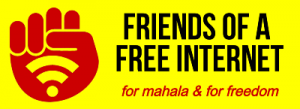Our Context
Information technology (Infotech) is increasingly shaping our lives and the Covid pandemic has accelerated the need for online interaction.
This process has the potential to enable greater access to information, openness and transparency, greater freedom of expression, solidarity, as well as stronger and more democratic forms of organising. But the digital age is reproducing the inequality and injustice of the society it is emerging in. We see not only an increasing divide between the power of those who have decent internet access and the majority, but also new forms of domination.
Rising authoritarianism (including surveillance, censorship and propaganda) is transforming our public spaces into open air prisons where we are constantly watched and trained to police ourselves – as well as surveillance capitalism that is transforming our privacy into something to be bought and sold.
The right to communicate is emerging as a critical freedom to defend and advance in response to a digital feudalism where governments and a handful of large corporations control networks, platforms, technology and can shape content.
The Internet in South Africa
67.3% of South Africa has access to the Internet and the potential to access information and publish at very low cost. There are many alternatives to for-profit networks
But the vast majority have no access to broadband/fibre and rely on slow profiteering mobile networks to access the internet. Access mirrors and reproduces broader racial and gender inequalities.
The Internet can offer activist organisations a platform for their own internal democracy, organising efforts, and amplify their voice
Surveillance and lack of privacy make on-line organising efforts vulnerable to repression
Network Access & Cost
Historically around the world network access has expanded, the cost of data has decreased, and network speeds have increased.
SA’s networks are dominated by commercial interests that put profit before people and the Government has consistently missed their connectivity targets.
Icasa has recently published regulations obligating networks to over 97% of SA and connect public buildings (schools, clinics, etc)
Commercial networks in the past have chosen to pay minimum fines rather than cover the cost of building networks in “uneconomical” areas.
Icasa’s new regulations obligate networks to zero-rate PBO mobile content;
The conditions of zero-rating will be highly contested by network/internet profiteers.
State/capitalist surveillance & censorship
South Africa’s Bill of Rights protects free expression and technology is making expression increasingly easy;
The newly enacted Internet Censorship Act gives the Film and Publication Board teeth to regulate and take down online content. Hate speech law is in the pipeline.
The Bill of Rights also protects privacy and the Information Regulator has been set-up to defend privacy. The Constitutional Court has ordered parliament to amend RICA and the Mufamadi Report has recommended reform of State Security;
Surveillance capitalism collects and commodifies personal information (in exchange for “Free Services”). The SA government has not amended RICA or implemented the Mufamadi recommendations.
